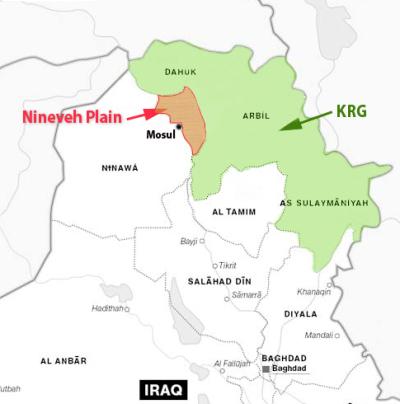

 Mosul, Iraq (AINA) -- The continuing attacks on Assyrians in Mosul have been followed by a string of accusations from different sources claiming Kurdish involvement in the events that has forced 15000 Assyrians to flee the city of Mosul. Iraqi MP Osama Al Najifi, a native of the Mosul area, was the first high ranking official to point to Kurdish involvement in the attacks (AINA 10-12-2008). More recently a spokesman from Iraq's interior ministry said there is no evidence of Al Qaeda involvement (AINA 10-16-2008), and a high ranking Assyrian leader, Mr Yonadam Kanna, also a member of parliament, confirmed to reporters the assailants were wearing army uniforms. Adding to the suspicion, five known Sunni insurgent groups, including Al Qaeda, issued statements denouncing the attacks and denying involvement in them.
Mosul, Iraq (AINA) -- The continuing attacks on Assyrians in Mosul have been followed by a string of accusations from different sources claiming Kurdish involvement in the events that has forced 15000 Assyrians to flee the city of Mosul. Iraqi MP Osama Al Najifi, a native of the Mosul area, was the first high ranking official to point to Kurdish involvement in the attacks (AINA 10-12-2008). More recently a spokesman from Iraq's interior ministry said there is no evidence of Al Qaeda involvement (AINA 10-16-2008), and a high ranking Assyrian leader, Mr Yonadam Kanna, also a member of parliament, confirmed to reporters the assailants were wearing army uniforms. Adding to the suspicion, five known Sunni insurgent groups, including Al Qaeda, issued statements denouncing the attacks and denying involvement in them.
Several observers have noted the attacks, which started two weeks ago, have occurred in the eastern side of the city, which is controlled of Kurdish forces. Assyrians (also known as Chaldeans and Syriacs) living in the western part have not been harmed, but on Tuesday a bomb went off in front of a church in the western, Arab dominated part of the city -- only after accusations of Kurdish involvement started being made.
Condemnations of the violence were issued by Kurdish leaders only after growing accusations in Iraq against the Kurds. The extensive measures taken by the Kurdish Regional Government (KRG) in ordering its ministries and departments to provide aid to the affected Assyrian families, according to a KRG press release, could reflect a growing Kurdish desperation to divert attention from the mounting accusations it is facing. The KRG has not bothered to help Assyrians during previous periods of attacks against them.
Some media reports have described the recent attacks as retaliation by Islamic groups because of Assyrian demonstrations against the removal of their quota seats in the provincial councils (AINA 10-6-2008). Assyrians have, however, protested and taken to the streets several times since the war started and some 50,000 Assyrians take to the streets each year on April 1st, celebrating the Assyrian New Year, without any retaliation by terrorist groups.
Suspicions of Kurdish involvement are also strengthened by the unspoken aim of the Kurdish leadership of annexing large parts of the Nineveh province into their semi-autonomous region. The two main Kurdish parties, the KDP and PUK, hold 32 of 41 seats in the Nineveh Provincial Council and dominate its executive council. Police and army units in Mosul are comprised mostly of ethnic Kurds, and the Kurdish intelligence service the Asayesh, has been confirmed to operate in the Mosul area. Kurdish political and military control in the Nineveh province and its capital Mosul are considerable.
The Assyrians, who together with other non Muslim minorities dominate the Nineveh Plain area east of Mosul, have found themselves stuck in the midst of a power struggle between Arabs and Kurds. Attempts to provide adequate security for the minorities in the Nineveh Plain have been obstructed by the Kurdish majority in the Nineveh Province Council. The Kurds have stopped the implementation of a government order from June 2006 calling for the establishment of a local (Assyrian) police force for the Nineveh Plain (AINA 5-1-2008).
The Kurdish leadership has announced it aims to annex the Nineveh Plain into its semi-autonomous region. The obstruction of the local police force is believed to be a result of this. While hindering a legitimate police force from providing much needed security for the minorities in the Nineveh Plain, the Kurdish political parties are ushering in armed groups, under the disguise of "Christian defense committees," into the Nineveh Plain. The goal is to maintain Kurdish control in the area and coerce the inhabitants into voting for annexation to the KRG in future referendums.

or register to post a comment.